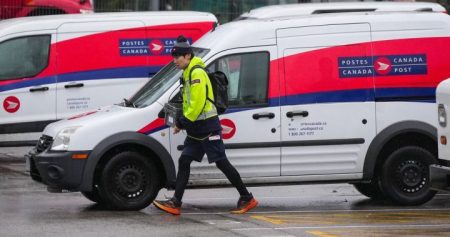The ongoing strike by Canada Post workers has resulted in some unusual mail delivery methods, including photo radar tickets being taped to recipients’ front doors. Lindsay Lagimodire, a Calgary resident, experienced this firsthand when she received a speeding ticket affixed to her door late one evening. Initially suspecting a scam, she soon realized it was a legitimate ticket, albeit delivered in an unconventional manner. This unusual delivery method stems from the ongoing labor dispute between Canada Post and its employees, which has disrupted regular mail services. Lagimodire’s experience highlights the lengths to which authorities are going to ensure the continued enforcement of traffic laws during the postal disruption.
The Calgary Police Service (CPS) confirmed that since November 15th, they have issued approximately 19,500 speeding tickets across Calgary and its surrounding areas. This significant number of infractions underscores the ongoing efforts to maintain road safety despite the challenges posed by the postal strike. Anticipating the potential disruption to mail service, the CPS proactively sought and obtained a court order on November 14th, authorizing the delivery of tickets via courier services. This preemptive measure allowed the police to continue enforcing traffic laws and issuing tickets without relying on the disrupted Canada Post network. Alison Turgeon, a supervisor with the CPS, explained that this court order was crucial in enabling the timely delivery of tickets.
The volume of tickets issued represents a substantial portion of Calgary’s population, approximately 1.2 percent. This high number reflects both the ongoing enforcement efforts and potentially the increased reliance on photo radar technology in the absence of regular patrolling affected by the strike. The unusual delivery method employed by the courier service, in Lagimodire’s case taping the ticket to the door, highlights the adaptability required during the postal disruption. While unconventional, the method ensures the ticket reaches the intended recipient, fulfilling the legal requirement of notification.
The CPS emphasized that tickets are mailed to the registered address of the offending vehicle. This means that individuals may receive tickets for vehicles they no longer own or that are registered in their name but used by others. Turgeon clarified that receiving a ticket addressed to someone else at one’s address is simply a case of misdelivery and requires no action from the recipient. The onus remains on the registered owner to address the ticket, regardless of who physically receives it. This clarification addresses potential confusion arising from the unconventional delivery method and ensures individuals are not unduly concerned by receiving tickets that do not pertain to them.
The case of Lagimodire receiving a speeding ticket taped to her door, while unusual, is not unique. She expressed relief upon learning that others were experiencing similar unconventional delivery methods. This shared experience highlights the broader impact of the postal strike on various aspects of daily life, extending beyond the typical inconvenience of delayed mail. The unusual circumstances have also injected a touch of humor into an otherwise frustrating situation, as Lagimodire noted, finding amusement in the unusual delivery method.
The ongoing postal strike has necessitated innovative approaches to essential services, including law enforcement. The delivery of traffic tickets via courier and the subsequent, sometimes unusual, methods employed by couriers to ensure delivery underscore the adaptability required during such disruptions. While the taped-to-the-door delivery method may not be ideal, it reflects the commitment to maintaining law enforcement processes and upholding road safety despite the challenges posed by the strike. The situation also serves as a reminder of the interconnectedness of various services and the cascading effects that labor disputes can have on seemingly unrelated aspects of daily life.










